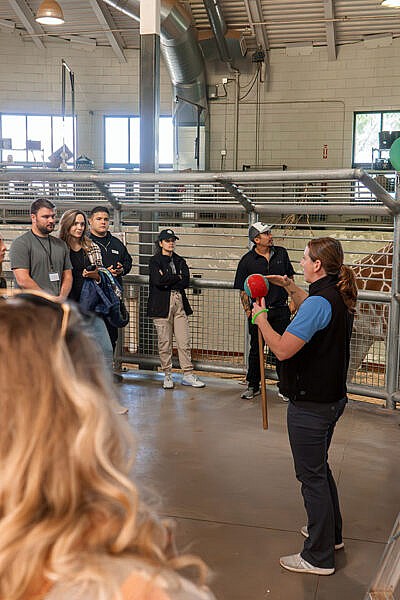In early November, the International Center for the Care and Conservation of Giraffe (The Giraffe Center) traveled to Bristol Zoo, in the United Kingdom, to host their first giraffe care workshop abroad. Cheyenne Mountain Zoo established The Giraffe Center in 2022 to serve as a resource for giraffe caregivers worldwide.

“We have hosted giraffe care workshops all over the U.S. and virtually with teams in other countries, but Bristol Zoo’s workshop was our first international in-person outreach,” said Amy Schilz, senior animal behaviorist at The Giraffe Center. “It’s really helpful for us to work hands-on with teams and their giraffe herds in their facilities. Our training and care teachings share a common foundation, but we can understand their challenges and obstacles better when we experience them, which means we’re better able to customize their training.”
Through their combined decades in the giraffe care field, The Giraffe Center team had previous working relationships with a Bristol Zoo giraffe keeper, who managed logistics for the workshop in England so The Giraffe Center team could focus on the 4-day workshop curriculum. Attendees included Bristol Zoo’s giraffe care team and British and Irish Association of Zoos and Aquariums’ Giraffe Focus Group members. The workshop included lecture-style presentations, group discussions, role-playing and actual practice focused on giraffe nutrition, natural behaviors, hoof anatomy and care, and positive reinforcement training.
“Just like when we’re training animals, we use small approximations to move through training steps with our workshop attendees,” said Diana Miller, giraffe specialist at The Giraffe Center. “Before we start training with the giraffe, we practice hands-on with humans, so we’re presenting the best polished training to the giraffe. Instead of realizing questions you need to ask while you’re working with a giraffe, you can recognize what you don’t know while you’re practicing with a human.”
Practicing hoof care on humans isn’t as far-fetched as it sounds. Attendees move through the motions they will present to giraffe, with Schilz and Miller guiding them. They role play where they’ll stand, where the giraffe needs to stand, how they’ll hold their target stick and hoof trimming tools, how they’ll deliver verbal and physical cues, how they’ll access reinforcers – like crackers or carrots – and how quickly to reinforce the right behaviors. They also practice trimming hooves on cadaver hooves from reputable sources.

“The fact that Bristol Zoo invested in this workshop shows how dedicated their team is,” said Schilz. “When we started working with their giraffe, it was even more obvious how strong their relationships are with their keepers. The Bristol Zoo giraffe were comfortable, social and engaged, and that gives us a great foundation to build upon with new or different techniques.”
In positive reinforcement training, one of the first questions The Giraffe Center team asks themselves is, ‘what does the animal need to know in order to know something else?’ Because giraffe are often food motivated, the first thing they need to know is how to eat politely.
“Teaching a giraffe to eat and stay still while they’re eating is a prerequisite for blood draws, ultrasounds, hoof care and more voluntary behaviors,” said Miller. “It’s a lot harder than you think to teach that. You’re learning to communicate as a giraffe-caregiver team, and you’re finding a balance between maintaining their excitement for the reward food item and teaching them they can trust that we will deliver it when they stand still.”
The teams worked together to make progress on hoof care, stand-still behavior, target training and more. They also shared insight on giraffe nutrition and natural foraging behaviors, and other topics central to good giraffe welfare in human care.
The Giraffe Center team’s experience with their first overseas workshop further ignited their passion for giraffe care and for supporting the people who can truly make a difference in setting the standard for excellent giraffe care.
“In 2015, when we were starting training programs, we were focused on showing people what’s possible,” said Schilz. “Now, we’re really honing our teaching skills. We’re constantly pursuing education, connecting with other experts in our field and sharing what we’re learning, so we can be the best central resource for other giraffe organizations.”

Cheyenne Mountain Zoo made an investment in The Giraffe Center that gives all giraffe caregivers access to a dedicated team focused entirely on giraffe care and conservation.
“The more we host these workshops, the more we learn and share,” said Miller. “It’s all about creative collaboration. We take the same science and apply it differently depending on the animals, humans and environment they are in. That’s our goal for the Giraffe Center – to be a custom-built resource for other giraffe care teams.”
The Giraffe Center is booking workshops for giraffe care teams and giraffe enthusiasts globally. For more information, visit cmzoo.org/giraffecare.

